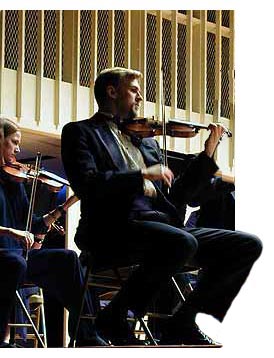Silas, Paul's second fiddleOnce, when New York Philharmonic conductor Leonard Bernstein was asked what is the instrument in the orchestra most difficult to play, he answered, "Second fiddle." How hard it must be to play consistently in the concert master's shadow. Silas was Paul's second fiddle throughout the second and third missionary journeys.
Silas is an enigmatic biblical figure. He must have been outstanding, for the leaders of Jerusalem appointed him to accompany Paul and Barnabas back to Antioch after the conference on circumcision. Luke (the author of Acts) says he was a prophet, and upon arriving in Antioch, he "said much to encourage and strengthen the brothers" (Acts 15:32). In Acts 16 – 18, Silas becomes a major character in the drama, joining Paul on his second missionary journey, staying behind in Macedonia to nurture the spiritual babies Paul was forced to leave too soon. After that, Silas mysteriously slips out of sight. Luke never mentions him again in Acts; nor do Paul's letters after those early years. Silas must have kept on serving behind the scene, where he probably made a big difference. He resurfaces only once, when Peter remarks, "With the help of Silvanus, whom I regard as a faithful brother, I have written to you..." (1 Peter 5:12). Some scholars believe that it was Silas who gave First Peter its eloquent language. Second Peter has the rough grammar and wording that are more like what we would expect from an unschooled fisherman like Simon Peter. What would Paul have accomplished without this man Silas? Would all of his "concertos" have been as beautiful, or would they even have occurred at all? It is hard to say. Because Silas was willing to play second fiddle, his contrapuntal harmonies enhanced Paul's melodies, creating a full-length duet to God's glory. God, give us more men and women with the humility and dedication of Silas! |
| —Steve Singleton DeeperStudy.com |
